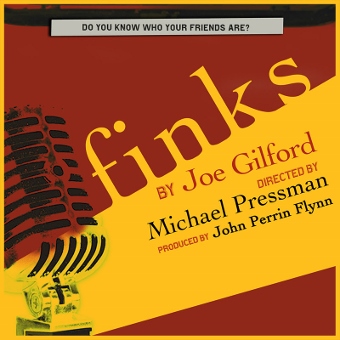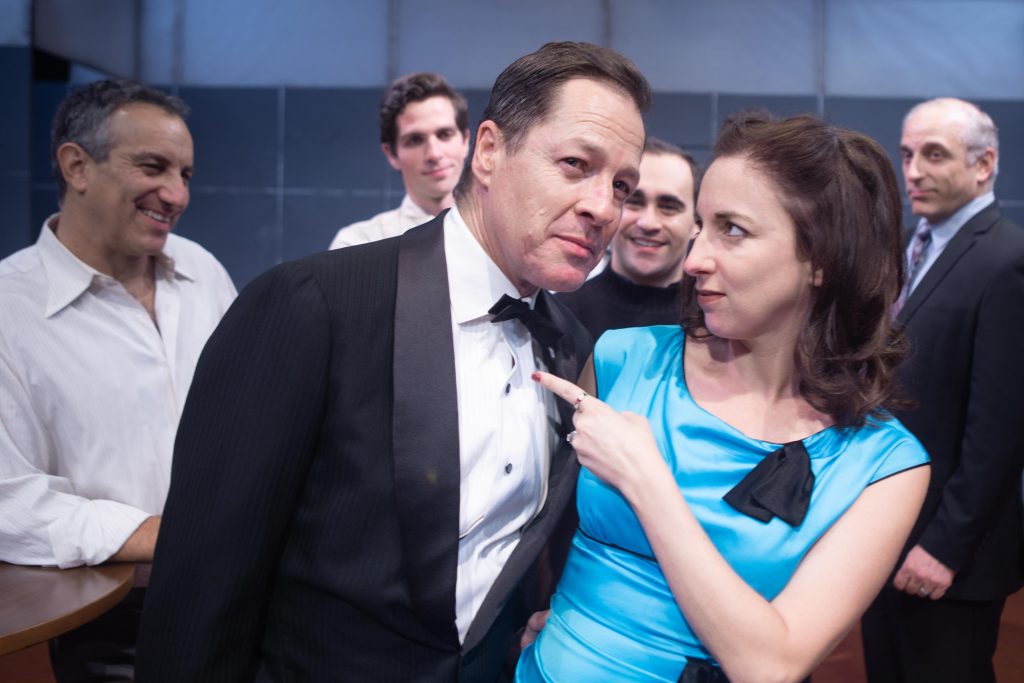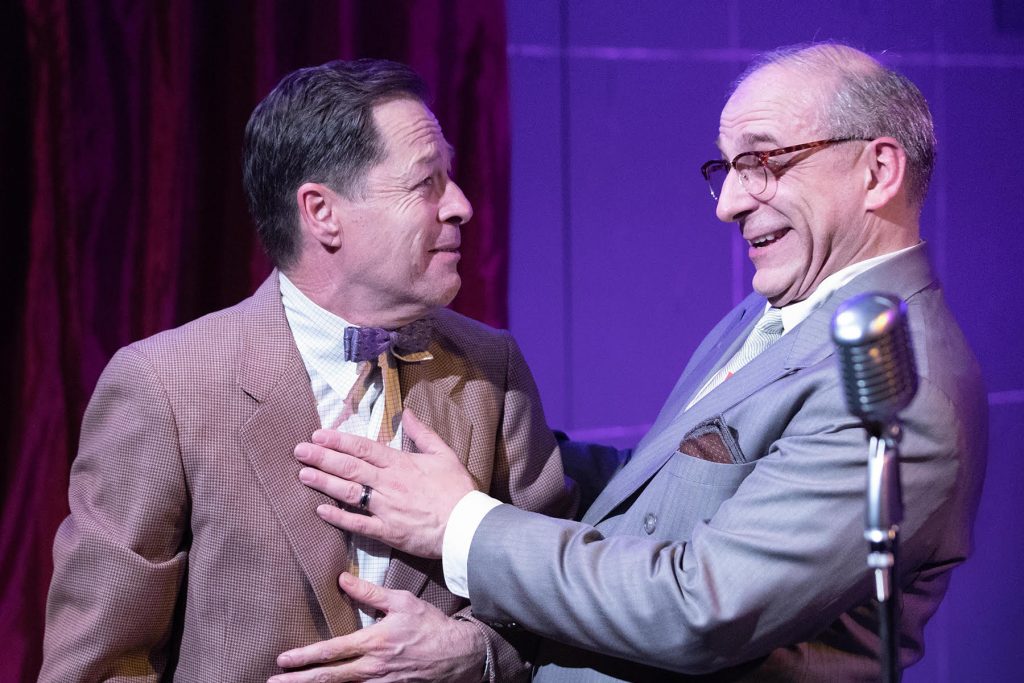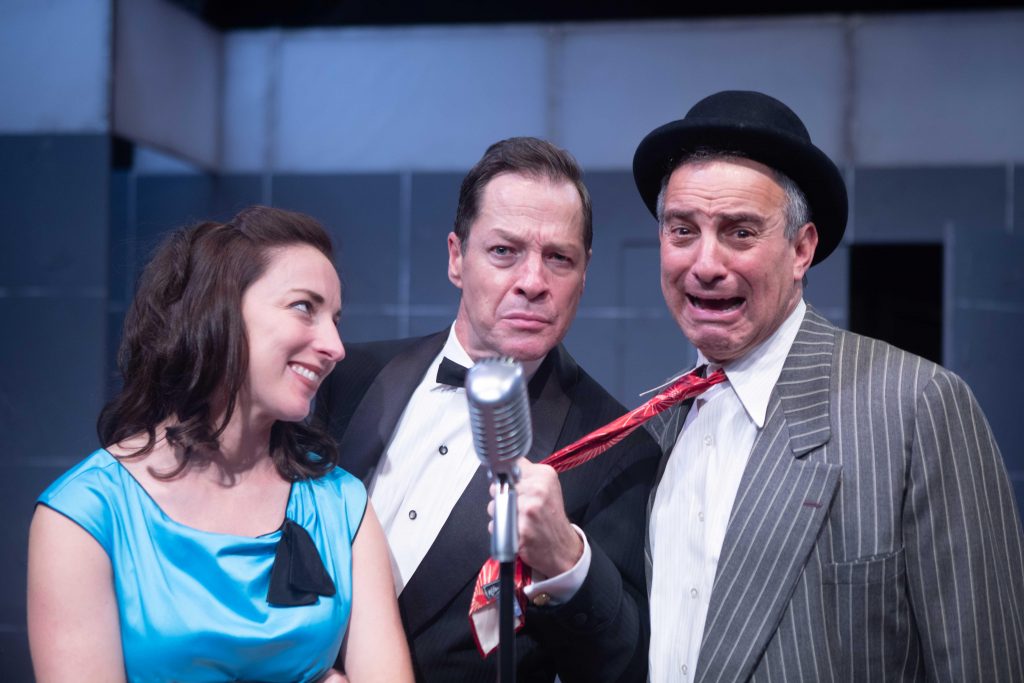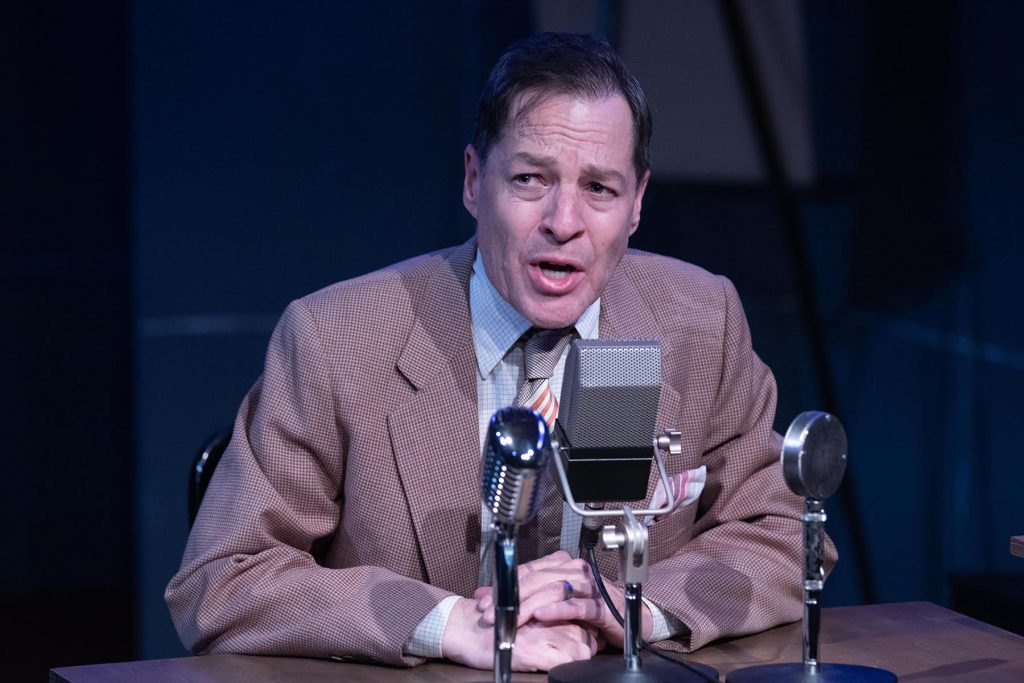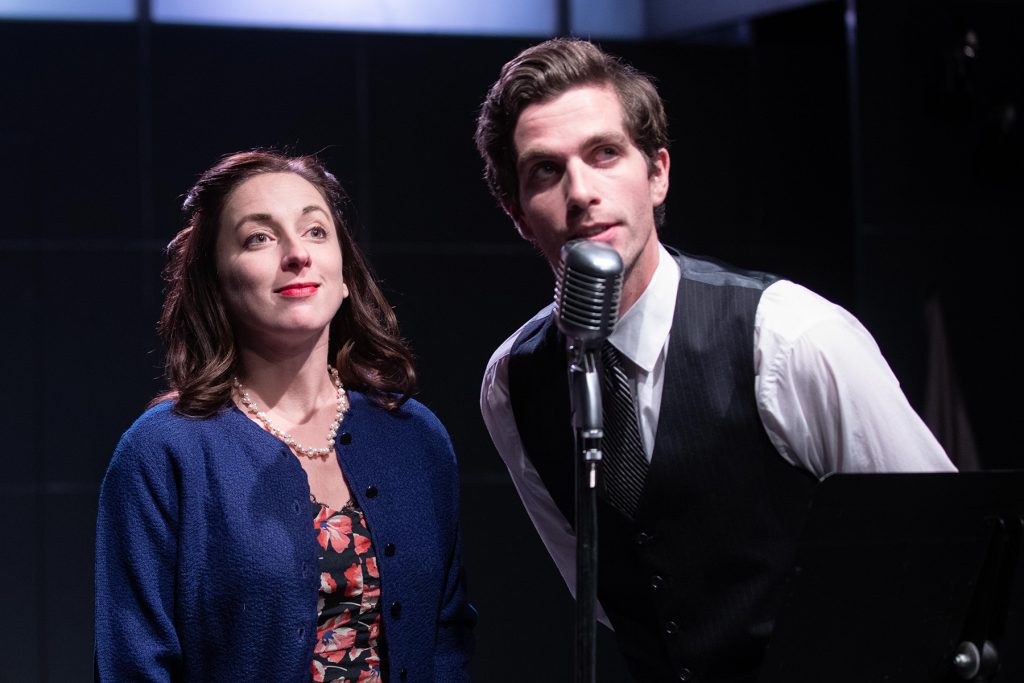SAVING YOURSELF
At the opening performance of Rogue Machine’s presentation of the Los Angeles premiere of playwright Joe Gilford’s Finks, artistic director John Flynn welcomed the audience and drew comparisons between Finks and Rogue Machine’s other current offering, Oppenheimer. The two plays do complement one another. It could be said that the creation of the atomic bomb has everything to do with the Red Scare that spread across the country and swallowed up the entertainment industry, among many other industries and communities.
Both plays exist within worlds of awesome dread, and both are leavened by quick humor, pathos, and excellent writing. Finks feels more personal. I don’t mean that in the sense of it being more personal to its playwrights than the other project, but that it hits closer to home for me. Oppenheimer’s physics are not in my wheelhouse, but I have thought a lot about the McCarthy Era, and have written about the fringes of it in my own work about the history of Confidential Magazine, a sometimes purveyor of stories attacking supposed Reds and other progressives. Their celebrity stuff was much more popular, though, and eventually the political articles were phased out and anti-Communist writer Howard Rushmore, who had once worked for McCarthy and Roy Cohn, turned against the magazine.
Today, as I struggle to find emotional balance during the current state of our civic life, I find accounts of the McCarthy Era strangely comforting. There are undoubtedly parallels between that time and now, yet, for creative artists, the horrific consequences of the House Un-American Activities Committee’s unconstitutional witch hunt were much worse than anything happening to this community now. Civil rights, immigration, and the environment under Trump are a whole other bag of terrors, with results that are very much as awful as, if not worse than, anything happening during the height of the HUAC.
Yet in television, film, and theater, railing against the current administration is the norm, and no one is losing his or her livelihood as a result of anti-Trump activities. Quite the opposite. I suspect there is some truth to the charge that open Trump supporters find it rough going right now in New York and Los Angeles. (On the other hand, I don’t know that Scott Baio would be much in demand regardless of his politics.) I try to imagine what it would be like if every network, streaming service, film company, and studio was obliged by Congress, stockholders, and sponsors to jettison anyone who spoke against Trump. That is not the world we are living in.
Finks is centered around the highly charged environment that enveloped progressives in the arts, some Communists, some not, who were coerced by the committee, under threat of losing their freedom, their careers, and in some cases, their families, unless they informed on their friends, loved ones, and compatriots. It is easy and reassuring to imagine oneself as one of the famous hostile witnesses like Dalton Trumbo, Arthur Miller, or Lillian Hellman, all of whom refused to name names. It is less comfortable to picture oneself as one of the finks — like Elia Kazan, Lee J. Cobb, or Budd Schulberg, all of whom did go on the record and name names. The three of them feature as characters in Finks, and it is shocking to hear their actual testimony quoted, in all its creepy obsequiousness.
Toward the end of the play, one of the characters says, “We’ll be ok. And all those finks will get theirs.” And I thought to myself, yeah, they’ll get theirs, they’ll get their Oscars, Emmys, and Tony Awards. In 1954 Kazan directed On the Waterfront, with Cobb as one of the stars, and a script by Schulberg. Marlon Brando played a fink, and it was a critical and commercial smash, getting twelve Academy Award nominations, and winning eight, including Best Picture, Best Actor for Marlon Brando, Best Supporting Actress for Eva Marie Saint, and Best Director for Kazan. It’s a great film. It’s also a hideous betrayal and a self-serving justification for its creators.
One of the great strengths of Joe Gilford’s play is that it takes us inside what it feels like as each person tries to decide what to do. They are not sure themselves sometimes what choice they will make. I have no doubt that Mr. Gilford and director Michael Pressman have very strong feelings about who was right and who was wrong. Gilford’s parents, Jack and Madeline Gilford, and Pressman’s father, David Pressman, were blacklisted. Yet the play gives a fictionalized version of Jerome Robbins that is sympathetic if unforgiving. Confronted by his friend, he says, “I’m evil because I finked, OK? Is that what you want to hear?” She replies acidly, “You’re not evil because you finked’¦ You finked because you’re evil.”
And yet’¦ There is an emotional logic to the argument made by people like Kazan. He didn’t support the Communist party, especially after the Stalinist purges, and he had fallen out with many of his former progressive colleagues. The committee already had the names of everyone he named, so what possible difference would it make if he went on the record repeating those names? He was at the height of his career, one of the most famous directors in America. Why should he have to give that up to support a cause he didn’t believe in?
If we cannot understand that logic, if we cannot understand how and why someone would name names, then we learn nothing. It is the choice the main character of the play, as well as many of the other characters must face. Nightclub comic Mickey Dobbs (French Stewart) falls in love with Natalie Meltzer (Vanessa Claire Stewart), a progressive firebrand who urges him to perform to help raise funds for various liberal causes. Their friends Fred Lang (Bruce Nozick) and Bobby Gerard, the Jerome Robbins-based character (Adam Lebowitz-Lockard) share their beliefs, though Mickey is more interested in show business than politics. When he is targeted right as he is on the verge of making it big, the decision he must make is heartbreaking.
French Stewart is fantastic, he wears hangdog panic like a bespoke suit, and he is quite believable as a comic of the era on the brink of mainstream stardom. “You can’t be too careful these days. Everyone’s scared, even us comedians,” Mickey says to his Café Society audience, “Red Buttons is so terrified, he changed his name to ’˜Blue.’ And Red Skelton just changed his name to ’˜Buttons.’ It’s gotten so bad, I heard you can’t even borrow a book from the public library without someone tapping your telephone. And they’re right. I mean, what if you were seen reading the Constitution?”
We sympathize with the sentiment (the audience roars its approval) but more importantly, at least to whether the play succeeds or not, the line is funny. When Mickey’s agent tells him he could be big, he is right. Stewart’s delivery is killer and so is the material. If we don’t believe in Mickey’s future, we won’t fear for him when that future is threatened. And we most certainly do care. The knot in my stomach kept getting bigger and tighter as the fateful moment of reckoning approached. Those who name names believe they are saving themselves. Those who refuse also believe they are saving themselves. How will Mickey choose to survive?
As Natalie, Mickey’s girlfriend and later wife, Vanessa Claire Stewart (French’s real-life wife) is equally believable as a lefty who could make a guy do anything for her. Both the actress and the script embrace Natalie’s liberal ruthlessness without sacrificing her substantial heart. She loves Mickey. Their partnership is touching and real. You feel they will weather this storm. When Mickey comes under fire he never blames Natalie for dragging him into her world. There is something incredibly endearing and reassuring about that.
Bruce Nozick and Adam Lebowitz-Lockard are both effective, as is the rest of the cast, most of whom perform multiple roles as they switch back and forth between the lives of the characters and scenes from the Senate hearings. The radio and television sequences are charming. Early on, in between making a pitch for her director to buy tickets to a benefit, Natalie delivers a perfect radio commercial for Desitin Ointment, playing all of the roles, crying baby, little boy, and mother, before the announcer (with the dead-on mellifluous sincerity of Stephen Tyler Howell) takes over with the tagline.
There is another parallel between Oppenheimer and Finks that I am somewhat reluctant to mention, because I passionately believe that writers should write about whatever they want to write about. Yet I am troubled that Oppenheimer and Finks both have so few female characters. The cast of Finks has eight men and just one woman. She is a fantastically well-written character, and the actress shines. But there were many, many women caught in the blacklist, including Lena Horne, Judy Holiday, Lee Grant, Ruby Dee, Stella Adler, Gale Sondergaard, Barbara Bel Geddes, Lee Grant, Kim Hunter, Ruth Gordon, Dolores del RÃo, and even Gypsy Rose Lee.
Mr. Gilford is not obligated to tell any story but the one he wants to tell, and this story is personal to him, that it is centered around men may be exactly right. I just think we all need to think more about equity and inclusion, not necessarily on the grounds of “fairness,” but on the grounds of telling interesting stories. Myself included. I’m not a straight white guy, but I catch myself thinking of straight white guys as “the norm” and the rest of us as “the other.” Why is that?
photos by John Perrin Flynn
Finks
Rogue Machine Theatre
Electric Lodge, 1416 Electric Avenue in Venice
Fri at 8; Sat at 3; Sun at 7 (dark on 11/16 & 12/21;
added performances on 11/26, 12/1 & 12/8 at 8)
ends on December 30, 2018
for tickets, call 855.585.5185 or visit Rogue Machine
